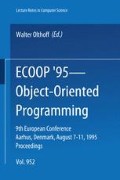Abstract
In most object-oriented data models objects must belong to a single most specific class. This exclusive link between an instance and a class is often not adequate to model real-world situations. In this paper, we present an approach where objects can belong to several most specific classes. We formally address how the resulting conflicts can be handled, both for structural and behavioral components of objects. In particular, we formalize a notion of context and characterize the state of an object in terms of the set of its most specific classes. Moreover, we discuss two different dispatching approaches, one allowing context-dependent behavior, the other one ensuring behavior identity.
Work partially supported by the EEC under ESPRIT Project 6333 IDEA.
Access this chapter
Tax calculation will be finalised at checkout
Purchases are for personal use only
Preview
Unable to display preview. Download preview PDF.
References
R. Agrawal, L. DeMichiel, and B. Lindsay. Static Type Checking of Multi-Methods. In A. Paepcke, editor, Proc. Sixth Int’l Conf. on Object-Oriented Programming: Systems, Languages, and Applications, pages 113–128, 1991.
A. Albano, R. Bergamini, G. Ghelli, and R. Orsini. An Object Data Model with Roles. In R. Agrawal, S. Baker, and D. Bell, editors, Proc. Nineteenth Int’l Conf. on Very Large Data Bases, pages 39–51, 1993.
E. Bertino and L.D. Martino. Object-Oriented Database Systems-Concepts and Architecture. Addison-Wesley, 1993.
L. Cardelli and P. Wegner. On Understanding Types, Data Abstraction and Polimorphism. Computing Surveys, 17:471–522, 1985.
G. Castagna. Covariance and Contravariance: Conflict without a Cause. Technical Report LIENS-94-18, Département de Mathématiques et d’Informatique-Ecole Normale Supérieure, Paris, October 1994.
S. Ceri and R. Manthey. Chimera: A Model and Language for active DOOD Systems. In Extending Information System Techology-Second International East-West Database Workshop, Lecture Notes in Computer Science, pages 9–21, 1994.
C. Chambers. Object-Oriented Multi-Methods in Cecil. In O. Lehrmann Madsen, editor, Proc. Sixth European Conference on Object-Oriented Programming, Lecture Notes in Computer Science, 615, pages 33–56, 1992.
W. Chen, V. Turau, and W. Klas. Efficient Dynamic Look-Up Strategy for Multi-Methods. In M. Tokoro and R. Pareschi, editors, Proc. Eighth European Conference on Object-Oriented Programming, Lecture Notes in Computer Science, 821, pages 408–431, 1994.
D. H. Fishman et al. Overview of the Iris DBMS. In W. Kim and F. H. Lochovsky, editors, Object-Oriented Concepts, Databases, and Applications, pages 219–250. Addison-Wesley, 1989.
R. Gabriel, J. White, and D. Bobrow. CLOS: Integrating Object-Oriented and Functional Programming. Communications of the ACM, 34(9):28–38, September 1991.
G. Gottlob, M. Schrefl, and B. Rock. Extending Object-Oriented Systems with Roles. To appear in ACM Transactions on Information Systems, 1994.
G. Guerrini, E. Bertino, and R. Bal. A Formal Definition of the Chimera Object-Oriented Data Model. Technical Report IDEA.DE.2P.011.01, ESPRIT Project 6333, May 1994. Submitted for publication.
W. Mugridge, J. Hamer, and J. Hosking. Multi-Methods in a Statically Typed Programming Language. In P. America, editor, Proc. Fifth European Conference on Object-Oriented Programming, Lecture Notes in Computer Science, 512, pages 307–324, 1991.
J. Richardson and P. Schwarz. Aspects: Extending Objects to Support Multiple, Independent Roles. In J. Clifford and R. King, editors, Proc. of the ACM SIGMOD Int’l Conf. on Management of Data, pages 298–307, 1991.
E. Sciore. Object Specialization. ACM Transactions on Information Systems, 7(2):103–122, April 1989.
L. A. Stein. A Unified Methodology for Object-Oriented Programming. In M. Lenzeruii, D. Nardi, and M. Simi, editors, Inheritance Hierarchies in Knowledge Representation and Programming Languages, pages 211–222. John Wiley & Sons, 1991.
Author information
Authors and Affiliations
Editor information
Editors and Affiliations
Rights and permissions
Copyright information
© 1995 Springer-Verlag Berlin Heidelberg
About this paper
Cite this paper
Bertino, E., Guerrini, G. (1995). Objects with Multiple Most Specific Classes. In: Tokoro, M., Pareschi, R. (eds) ECOOP’95 — Object-Oriented Programming, 9th European Conference, Åarhus, Denmark, August 7–11, 1995. ECOOP 1995. Lecture Notes in Computer Science, vol 952. Springer, Berlin, Heidelberg. https://doi.org/10.1007/3-540-49538-X_6
Download citation
DOI: https://doi.org/10.1007/3-540-49538-X_6
Published:
Publisher Name: Springer, Berlin, Heidelberg
Print ISBN: 978-3-540-60160-9
Online ISBN: 978-3-540-49538-3
eBook Packages: Springer Book Archive

